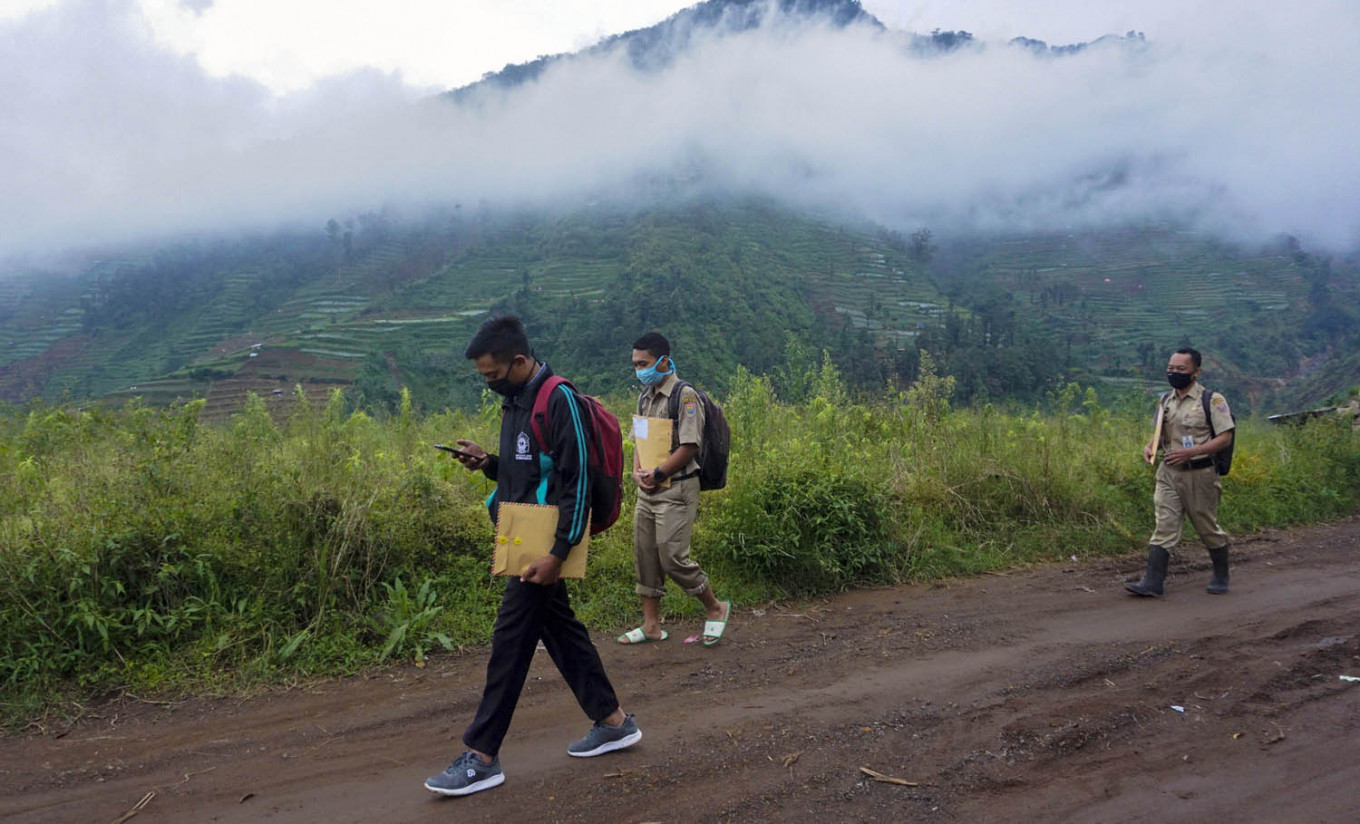Popular Reads
Top Results
Can't find what you're looking for?
View all search resultsPopular Reads
Top Results
Can't find what you're looking for?
View all search resultsTeacher recruitment needs upgrading for better quality, equality: IGI
Education reform, in particular the nation's centralized teacher recruitment system, is again a hot topic as schools juggle with online and offline learning options at the start of the new school year.
Change text size
Gift Premium Articles
to Anyone
I
ndonesia could see a decline in the quality of new teachers, as the government’s recent cancellation of civil service entrance exams could result in a haphazard recruitment process, a teachers’ union has warned.
Indonesian Teachers Association (IGI) chairman Muhammad Ramli Rahim said that the new policy would affect schools, which would struggle to replace outgoing teachers who retired or left for a different job.
IGI data shows that over 544,000 civil servant teachers will be retiring in the next four years, while around 226,000 teachers had retired in 2017-2020.
As a result, schools would rush through their selection process to find anyone who could replace their outgoing teachers, neglecting their selection criteria and perhaps sacrificing quality in terms of the incoming teacher.
“We have [a saying] that ‘if a goat holds a bachelor’s degree, then the goat might as well teach’,” said Ramli.
The policy to cancel the civil service exams also means that nonformal teachers would be denied the opportunity to advance to civil service status, which has a higher salary scale. At least 60 percent of all teachers in Indonesia were nonformal teachers paid by honorarium, Ramli said. Meanwhile, the preliminary results of an ongoing IGI survey found that 80 percent of all nonformal teachers it polled earned less than Rp 1 million (US$69.5) per month.
Indonesia's civil service system recruits both formal and contract teachers, and requires all teacher candidates to pass the civil service exam. Other aspiring teachers are informally recruited by individual schools as nonformal teachers who are paid by honorarium.
Ramli’s warnings follow last week's announcement from Administrative and Bureaucratic Reform Minister Tjahjo Kumolo.
Tjahjo announced on July 6 that the government had canceled the civil servant recruitment program for this year and next due to a delay in the final process of the 2019 recruitment program, which he attributed to the COVID-19 health crisis.
Read also: Civil servant recruitment for 2020 and 2021 canceled due to COVID-19, minister says
Teguh Widjinarko, the reform ministry’s acting undersecretary for state human resources, said on July 14 that while no new civil servants would be recruited this year, including teachers, the government planned to resume the selection program for contract teachers next year.
He added that the ministry also planned to collaborate with the health and the education ministries to hold “coaching clinics” for local administrations to manage state employees.
“We are responding to the concerns of stakeholders, in this case the [regions], the Education and Culture Ministry and the public, with good planning right from the outset,” said Teguh.
While praising the planned initiatives, IGI's Ramli also cautioned the government’s "halfhearted" stance on teacher recruitment, warning that poor recruitment had resulted in many current teachers who were teaching subjects in which they lacked expertise.
He pointed to poor regularity clarity for the shoddy recruitment process, low wages for the lack of professionalism among nonformal teachers, and teacher training institutions (LPTKs) for producing substandard teachers.
Ramli recalled a recent teacher recruitment held at his school in Makassar, South Sulawesi, during which only two out of 12 teacher candidates for English-language classes had demonstrated fluency in the language.
“No matter how good the curriculum or the facilities may be, the quality of the education that the students receive will be poor if the teachers are not good at teaching,” Ramli said.
He stressed that Indonesia could lag behind other countries in education if it did not reform its teacher recruitment system.
Read also: Spotlight on teachers as Indonesian student competence worsens
The 2019 Program for International Student Assessment (PISA) survey found a declining trend among Indonesian students in reading, mathematics and science skills, with the country ranking below Singapore, Malaysia, Brunei Darussalam and Thailand.
Meanwhile, the SMERU Research Institute published on June 29 a working paper indicating that the country was still struggling to improve the quality of its teachers because of institutional, political economy and social obstacles in recruitment.
The paper revealed, for instance, the muddled delegation of tasks between the relevant ministries and the centralized recruitment system. This had resulted in ideas raised at interministerial discussions playing a greater role in teacher recruitment than the input from local administrations, all the while stakeholders pursued their own interests over educational goals.
It also said that inequality between formal and nonformal teachers, as well as systemic bias for seniority over merit, had discouraged teachers from developing their professional skills and instead encouraged them to pursue civil servant status as a career goal.
Read also: Nadiem's reforms, up to teachers now
The SMERU paper recommended limiting the term of contract teachers to identify the best qualified and most passionate candidates for the job.
It also advised the government to address the absence of a state-level teacher management institution. Further, the government should develop mechanisms to stimulate public demand for high-quality teachers, instead of creating new laws to discourage politicking.
“The key to improving education performance starts with improving the stock of the country’s teachers,” said the paper's authors, who reviewed legal documents, conducted in-depth interviews and held focus group discussions.










